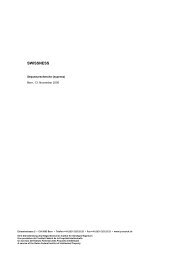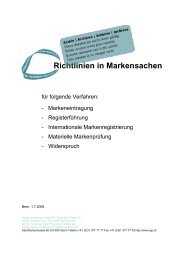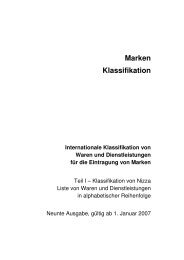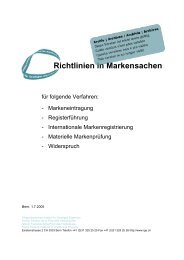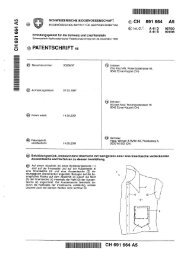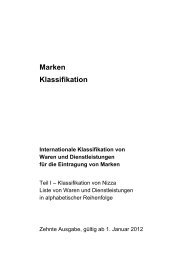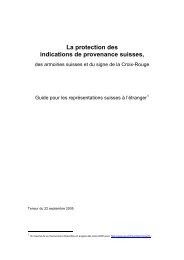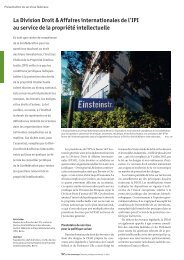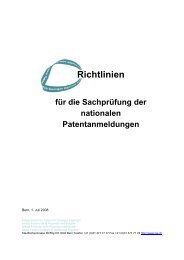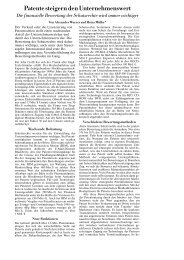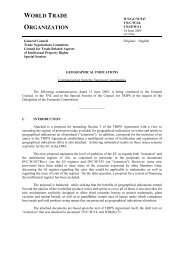AVIS DE DROIT PROTECTION DES SIGNES NATIONAUX
AVIS DE DROIT PROTECTION DES SIGNES NATIONAUX
AVIS DE DROIT PROTECTION DES SIGNES NATIONAUX
You also want an ePaper? Increase the reach of your titles
YUMPU automatically turns print PDFs into web optimized ePapers that Google loves.
AUSTRALIE<br />
(ii) National Insignia Used as Company or Business Names<br />
Certain words may not be included in the registered names of Australian companies ;<br />
Corporations Act 2001, subpara. 147(1)(c) and Corporations Regulations 2001, reg.<br />
2B.6.01(2) in conjunction with Parts 2 and 3 of Schedule 6. The non-exhaustive list<br />
unacceptable names includes, from the point of view of national insignia, the term “Made in<br />
Australia”. Any phrase or abbreviation having the same or a similar meaning would also be<br />
unacceptable. Schedule 6 also generically describes a number of categories of names which<br />
may not be registered: those suggesting a connection with an Australian federal, state or local<br />
government or with the government of any foreign country; those suggesting a connection<br />
with the royal family or the receipt of royal patronage; those suggesting that the members of<br />
the company are ex-servicemen or physically or mentally handicapped persons; those<br />
suggesting a connection with Australia’s most famous sportsman, Sir Donald Bradman (!).<br />
However, such names may be registered if the suggested connections really exist. Even more<br />
significantly, there are no restrictions on using names suggesting geographical or national<br />
connections to Australia or any foreign country and it is specified that the words “federal” and<br />
“Commonwealth” may form part of registered company names if they are used so as to<br />
indicate geographical connection, rather than a governmental connection.<br />
Those restrictions are largely mirrored in the rules governing registration of the names of<br />
unincorporated businesses in Australia. These rules are made under legislation enacted by<br />
each of the Australian States and Territories (for example, the Business Names Act 2002 of<br />
New South Wales) in largely uniform terms. There are nevertheless some variations. For<br />
example, the proclamation made 406 by the New South Welsh Minister for Fair Trading<br />
prohibits any business name “capable of suggesting connection with the government of a<br />
foreign country”, regardless of whether such a connection actually exists! On the other hand,<br />
that proclamation also contains a general prohibition of business names “which are<br />
misleading in relation to the nature, objects or purposes of the business carried on or to be<br />
carried on under those names”. That general prohibition would presumably cover names<br />
which contain false indications of national or geographical connection.<br />
(iii) Other Commercial Use of National Insignia<br />
The Trade Practices Act prohibits the making of deceptive statements in relation to the sale of<br />
goods and services. Sec. 52 has since 1974 generally prohibited trading or commercial<br />
conduct “that is misleading or deceptive or is likely to mislead or deceive”. That provision<br />
was held to cover cases where the national or geographical origins of goods were clearly<br />
misrepresented 407 . The Act was amended in 1986 to put this beyond doubt. Para. 53(eb) now<br />
prohibits the making of “false or misleading representation[s] concerning the place of origin<br />
of goods”. Difficulties have often arisen however, in determining the exact geographical<br />
origins of particular goods 408 . The Act was therefore further amended in 1998 to provide<br />
objectively applicable rules for determining the geographical origins of goods. These rules<br />
now appear in secs. 65AA to 65AN of the Trade Practices Act. They differentiate between<br />
406<br />
On pages 1423 and 1424 of the New South Wales Government Gazette of 15 April 2005.<br />
407<br />
Refer to Braemar Appliances Pty. Ltd. v. Rank Electronic Housewares Pty. Ltd, (1983) 78 Federal<br />
Law Reports 446.<br />
408<br />
Refer to the jurisprudence cited in Miller, R.V, Miller’s Annotated Trade Practices Act (Pyrmont,<br />
NSW, 21st ed, 2000), para. [1.53.60].<br />
229



